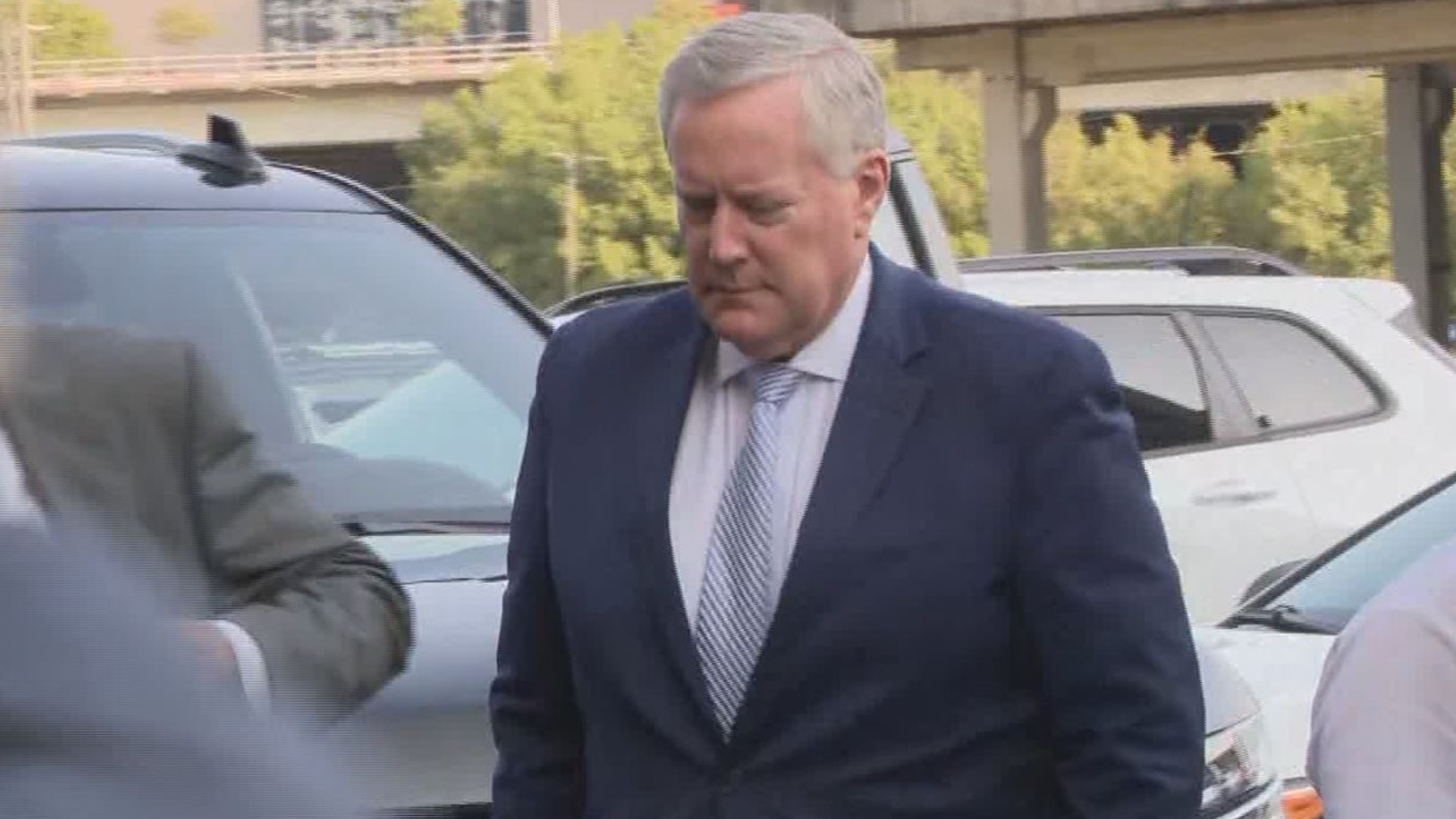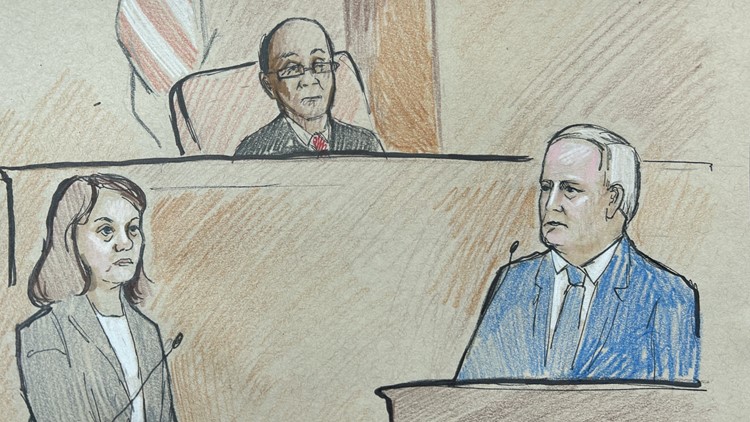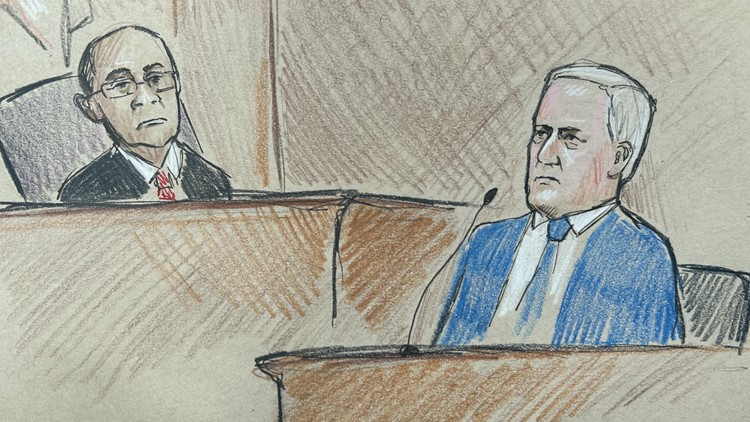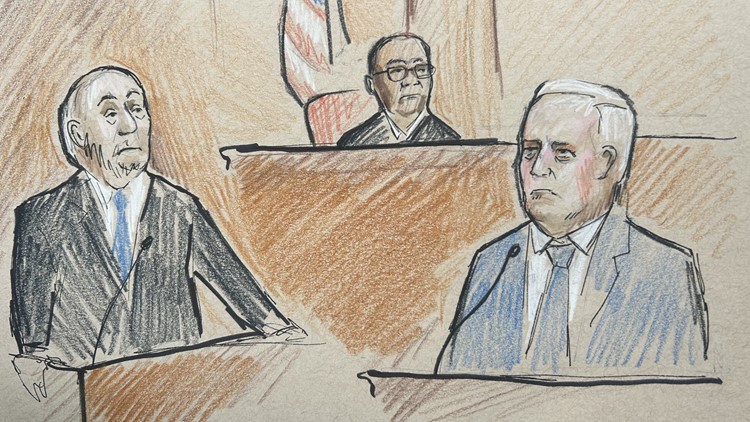ATLANTA — UPDATE: Trump White House chief of staff Mark Meadows took the witness stand at a hearing Monday to deny two of the allegations made against him in a Georgia indictment accusing him of participating in an illegal scheme to overturn the 2020 election.
Meadows, who was charged this month along with former President Donald Trump and 17 other people, is seeking to fight the charges in federal court rather than in state court. As part of that effort, he testified that he never asked White House personnel officer John McEntee to draft a memo to Vice President Mike Pence on how to delay certification of the election.
“When this came out in the indictment, it was the biggest surprise for me,” Meadows said Monday. He later said, “Me asking Johnny McEntee for this kind of a memo just didn’t happen.”
He also said he did not text the Georgia secretary of state’s office chief investigator, Frances Watson, as the indictment alleged. Rather, he said he believes that text was sent to Jordan Fuchs, the secretary of state’s chief of staff.
Fulton County District Attorney Fani Willis, who used Georgia’s racketeering law to bring the case, alleges that Trump, Meadows and the others participated in a wide-ranging conspiracy to try to keep the Republican president in power illegally even after his election loss to Democrat Joe Biden. Willis argues that Meadows' actions were political in nature and not performed as part of his official duties.
The extraordinary testimony from Trump's former chief of staff came as two of the former president's attorneys listened attentively in the courtroom. Monday's hearing in Georgia involved just one of four criminal cases that Trump is currently facing. In Washington, a judge overseeing a federal case over charges that Trump sought to illegally subvert the results of the 2020 election set a trial date for March 4, 2024, right in the heart of the presidential primary calendar.
Lawyers for Meadows argue that his actions that gave rise to the charges in the indictment “all occurred during his tenure and as part of his service as Chief of Staff.” They argue that he did nothing criminal and that the charges against him should be dismissed, and they want U.S. District Judge Steve Jones to move the case to federal court to halt any proceedings against him at the state level.
It was unclear when the judge planned to make his decision.
During Monday's hearing, Meadows attorney George J. Terwilliger III quickly called his client to the stand and asked him about his duties as Trump’s chief of staff. The lawyer then walked him through the acts alleged in the indictment to ask if he had done those as part of his job. For most of the acts listed, Meadows said he had performed them as part of his official duty.
In the cross-examination, prosecutor Anna Cross ticked through the same acts to ask Meadows what federal policy was being advanced in each of them. He frequently answered that the federal interest was in ensuring accurate and fair elections, but she accused him several times of not answering her question.
Willis' team argues that the actions in question were meant solely to keep Trump in office. These actions were explicitly political in nature and are illegal under the Hatch Act, which restricts partisan political activity by federal employees, they wrote in a response to Meadows' notice of removal to federal court. They believe the case should remain in Fulton County Superior Court.
The allegations against Meadows include participating in meetings or communications with state lawmakers along with Trump and others that were meant to advance the alleged illegal scheme to keep Trump in power; traveling to Atlanta's suburbs where a ballot envelope signature audit was happening; arranging a phone call between Trump and a Georgia secretary of state investigator; and participating in a January 2021 phone call between Trump and Georgia Secretary of State Brad Raffensperger during which Trump suggested Raffensperger could help “find 11,780 votes" needed for him to win Georgia.
Cross asked Meadows on Monday why he was present in an Oval Office meeting with Michigan legislators in which, the indictment alleges, Trump made false claims about election fraud in the state. Meadows said he was responsible for managing the president's time and it was important for someone to keep the meeting moving and wrap it up when it was finished.
Willis' team subpoenaed several witnesses to appear at Monday's hearing, including Raffensperger, Watson and two lawyers who did work for Trump in Georgia in the aftermath of the election but who were not named in the indictment. The team has also submitted excerpts of previously taken depositions of several people, including former Meadows assistant Cassidy Hutchinson.
Two of Trump's attorneys in the Georgia case, Steve Sadow and Jennifer Little, watched the proceedings in the courtroom, as did lawyers for at least one other co-defendant in the case.
Willis' team argues that Meadows is not entitled to immunity under the Supremacy Clause of the U.S. Constitution, which basically says that federal law takes precedence over state law, because his actions were “improper political activity” that weren't part of his official duties and the evidence shows that he had “personal or criminal motivations for acting."
In response to Willis' team's filing, Meadows' lawyers said all that is at issue at the moment is whether the case should be moved to federal court and that he has met that “very low threshold."
Meadows was a federal official and his actions were part of that role, they wrote, noting that the chief of staff has “broad-ranging duties to advise and assist the President.” The merits of his arguments of immunity cannot be used to decide whether the case should be moved to federal court, they argued.
They added that the “Hatch Act is a red herring, particularly at this stage," and shouldn't even be discussed until after the case is moved to federal court. “Nonetheless, Mr. Meadows complied with federal law in connection with the charged conduct," they wrote.
At least four others charged in the indictment are also seeking to move the case to federal court, including U.S. Justice Department official Jeffrey Clark. The other three — former Georgia Republican Party chair David Shafer, Georgia state Sen. Shawn Still and Cathy Latham — are among the 16 Georgia Republicans who signed a certificate declaring falsely that Trump had won the 2020 presidential election and declaring themselves the state’s “duly elected and qualified” electors.
Original story below
Donald Trump's former White House chief of staff, Mark Meadows, will be in federal court Monday for a hearing that could have big implications for the Georgia 2020 election RICO case.
Meadows is aiming to have his case moved to federal court, where he would further try to claim federal immunity from the state prosecution brought by Fulton County District Attorney Fani Willis.
Whether the case indeed should move to federal court will be the matter before Judge Steve Jones of the Northern District of Georgia on Monday morning. The hearing is set for 10 a.m. at the Richard B. Russell Federal Building on Ted Turner Dr.
RELATED: Mark Meadows wants Georgia 2020 election charges dismissed, argues he's immune from prosecution
In an order for the hearing, Judge Jones noted that Meadows argues "he was a federal officer acting under the color of his office at the time of the acts alleged" in the Fulton County indictment. That includes “arrang[ing] [a] meeting for the President at the White House and communicat[ing] with state lawmakers and officials" - Meadows faces charges in part for allegedly soliciting Georgia Sec. of State Brad Raffensperger to violate his oath of office, visiting Cobb County to observe their hand-count audit and communications with Frances Watson, the chief investigator in the Secretary of State's Office at the time of the 2020 election.
Meadows, in his argument for the case to go to federal court, is citing 28 U.S.C. § 1442, which Judge Jones' order notes requires showing “the case [is] against any officer, agency, or agent of the United States for any act under color of such office” and that “the federal actor or agency being challenged [raises] a colorable defense arising out of its duty to enforce federal law.”
The judge's order also touches on Meadows' secondary claim to federal immunity "under the Supremacy Clause of the Federal Constitution.”
Others in the case - among them former Justice Department official Jeffrey Clark and former Georgia GOP chairman David Shafer - have made similar requests to have their cases moved to federal court.
MARK MEADOWS FEDERAL COURT SKETCHES
How Judge Jones eventually determines the Meadow matter could have implications both for those defendants and, potentially, the entire case. Legal experts told 11Alive's Nick Wooten last week that if one case gets moved to federal court, it could trigger the same move for the rest of the 18 co-defendants - including Trump.
The possibility also seems to exist that some defendants in the case could be severed from the others, essentially creating a two-track trial with some people in Fulton County court and the others in federal court.
The former president has not yet filed for his case to move to federal court under arguments that would be similar to Meadows' - that he was acting in his capacity as a federal officer throughout the time period in the indictment, and that he is entitled to federal immunity from a state prosecution - though he is widely expected to do so.











